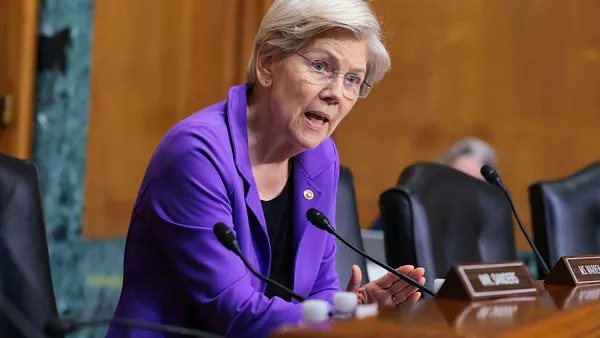Dive Brief:
- The American Sustainable Business Council filed a lawsuit against Texas Attorney General Ken Paxton and Comptroller Glenn Hegar in federal court Thursday, seeking a permanent injunction on the state’s law targeting firms for their alleged boycotts of fossil fuels, according to court documents.
- ASBC, which advocates for the transformation “towards a just and sustainable economy,” filed the complaint in the U.S. District Court for the Western District of Texas, alleging the state’s law, SB 13, violates the Constitution’s First and Fourteenth amendments.
- ASBC argued the law “both facially and as applied, is viewpoint- and content-discriminatory” and is also seeking a declaration that the rule is “unconstitutional and unenforceable,” according to the filing. Federal judges in Missouri and Oklahoma have issued permanent injunctions on anti-ESG laws and rules in the states in the past two months.
Dive Insight:
ASBC — whose members include Ben & Jerry’s, Patagonia and home cleaning supply brand Seventh Generation — said in the complaint Thursday that the 2021 Texas law violates the First Amendment rights to free speech and freedom of association and is unconstitutionally vague, in violation of the Fourteenth Amendment. The complaint alleges five counts of constitutional violations related to three provisions in the law.
Sustainable investment firms Etho Capital and Sphere — also among ASBC’s 200,000 members — each have a fund on the state’s list of more than 350 restricted investments. The organization said they are being discriminated against for their viewpoint, and the law violates their right to freely associate by framing memberships in “associations that advocate for sustainable and climate-conscious investing” as a potential boycott of fossil fuels. The group said other members of its organization are also unable to work with the state due to its “verification requirements and vague, overbroad language.”
“While SB 13 is in effect, ASBC members like Etho Capital, Sphere and others are unable to compete for business with Texas entities solely due to the content and viewpoint of their speech and the associations they choose to make,” the filing said. “The law also denies them any avenue for challenging their exclusion from this major market.”
The law requires the state to divest from and prohibits investments and contracts with firms deemed to “boycott fossil fuels.” ASBC said, arguing the scope of the law’s provision to bar the state from certain investments or contracts with companies that take “any action that is intended to penalize, inflict economic harm on or limit commercial relations with a company” over their fossil fuel stance is illegal.
“The sweep of this provision is contrary to the First Amendment, which protects speech and other expressive activities, even if a government does not like the content of that expression,” the filing said.
As comptroller, Hegar has used the law to ban 16 financial firms from working with the state entirely since 2022, most recently adding British bank NatWest to the list this month. BlackRock, among the initial 10 companies named to the restricted list, remains the only U.S.-based company barred from working with the state.
In his role as AG, Paxton banned Barclays from participating in the state’s municipal bond market in January, alleging the bank’s membership in the United Nations-backed Net Zero Alliance programs ran afoul of the law. The complaint also noted that Paxton said in an advisory opinion last fall that a company’s membership in the Net Zero Banking Alliance or “any other similar entity that espouses a commitment to the furtherance of so-called Environmental, Social and Governance policies,” should be “red flags” for governmental entities looking to comply with the law.















